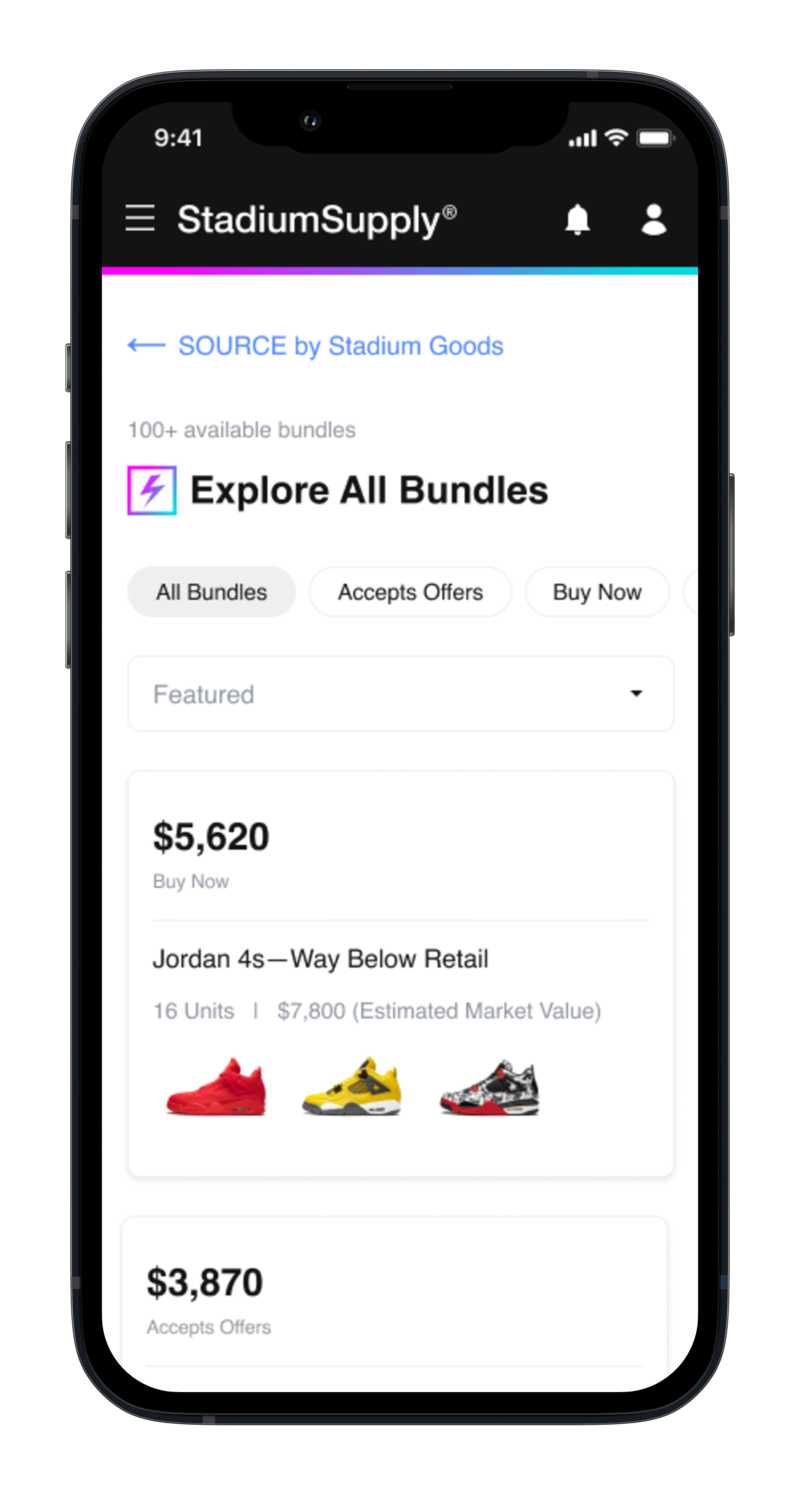
The Business of Fashion
Agenda-setting intelligence, analysis and advice for the global fashion community.

Agenda-setting intelligence, analysis and advice for the global fashion community.
 Opens in new window
Opens in new windowSneaker-consignment business Stadium Goods has quietly introduced a platform for customers to buy and sell in bulk.
Called Source by Stadium Goods, it aims to leverage the margin benefits of bulk buying to give consignors an easy option to clear inventory and buyers a way to get their hands on more stock to fatten their own resale profits.
Securing a sizable number of the sort of limited-release, hard-to-get shoes that fuel the secondary market is one of the biggest challenges in building up a resale business. It generally involves buying bots, joining “cook groups” where resellers share information and other steps that can be complicated and costly. It creates a high barrier to entry for those who want a bigger slice of the sneaker resale market, which Cowen has estimated could reach nearly $30 billion globally by 2030.
The new platform lets buyers purchase bundles of sneakers packaged and offered by Stadium Goods’ consignors. Stadium Goods handles the shipping, authentication and warehousing of the shoes, so the buyer doesn’t need to take possession of the goods. The shoes are listed for sale individually on Stadium Goods or Farfetch, which acquired Stadium Goods in 2018, and the buyer gets paid each time a pair sells. The buyer can also withdraw shoes, in case there are pairs they might actually want to wear or sell on their own. On sales of bundles, Stadium Goods take a 5 percent commission, versus the 20 percent cut it takes on one-off sales.
ADVERTISEMENT
Stadium Goods is now ready to start promoting the service, which debuted in beta on March 31. The bundles for sale during the initial launch quickly sold out, according to the company, with an average order value of $1,100. That figure has been rising, with bundles selling as high as $10,000 so far.

Stadium Goods likened the new model to commodities trading because buyers purchase in bulk and don’t even have to take possession of the goods before reselling them. Though unlike a commodity such as corn, the specific shoes matter, raising the chance of sellers squeezing less-desirable styles into the bundles as they clear their inventory.
Laura Sartor, the company’s chief strategy and product officer, said buyers can’t currently select the styles in a bundle, which the consignor puts together. Though she added it’s something the company may consider in the future.
“We are actually having our account management team review bundles in this early stage to make sure that we can stand behind the quality of the product,” she said. “It has to also be priced in such a way that we know it’s going to sell on our platform.”
To that end, Sartor said Stadium Goods’ pricing tools guide customers consigning bundles on how to price them so they also leave enough margin for the buyers to make a profit on their sales. There’s no guarantee, of course, that buyers will make money on every sale. Prices on the resale market tend to fluctuate based on supply and demand, so if a brand releases a restock of a sneaker — or tastes just shift elsewhere — the price a customer will pay for it can fall.
But Sartor believes the model can work for all involved. She noted the sell-through rate for sneakers resold from bundles is the same as those coming in via traditional consignment.
“Which says that we were on the right path with our pricing thesis — that there is room in this business model for everyone to benefit,” she said.
The luxury secondhand market is growing fast, but sustaining that growth hinges on players maintaining a steady stream of hot products to sell.
The fashion platform is seeking to gain an edge in the increasingly competitive online luxury space by picking up the growing streetwear consignment marketplace, which was valued at $250 million.
In his first one-to-one interview since his company's acquisition by Farfetch, the Stadium Goods co-founder talks to Imran Amed about his unconventional path to fashion, how he nearly ended up in the diamond industry, and defying the ‘streetwear bubble.’

Marc Bain is Technology Correspondent at The Business of Fashion. He is based in New York and drives BoF’s coverage of technology and innovation, from start-ups to Big Tech.
The rental platform saw its stock soar last week after predicting it would hit a key profitability metric this year. A new marketing push and more robust inventory are the key to unlocking elusive growth, CEO Jenn Hyman tells BoF.
Nordstrom, Tod’s and L’Occitane are all pushing for privatisation. Ultimately, their fate will not be determined by whether they are under the scrutiny of public investors.
The company is in talks with potential investors after filing for insolvency in Europe and closing its US stores. Insiders say efforts to restore the brand to its 1980s heyday clashed with its owners’ desire to quickly juice sales in order to attract a buyer.
The humble trainer, once the reserve of football fans, Britpop kids and the odd skateboarder, has become as ubiquitous as battered Converse All Stars in the 00s indie sleaze years.